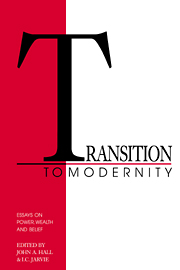Book contents
- Frontmatter
- Contents
- List of illustrations
- List of contributors
- Introduction
- PART I THE PRE-MODERN WORLD
- PART II TRANSITIONS TO THE MODERN WORLD
- 4 On a little known chapter of Mediterranean history
- 5 Ernest Gellner and the escape to modernity
- 6 The emergence of modern European nationalism
- 7 Sovereign individuals
- PART III MODERNITY AND ITS DISCONTENTS
- Indexes
4 - On a little known chapter of Mediterranean history
Published online by Cambridge University Press: 02 February 2010
- Frontmatter
- Contents
- List of illustrations
- List of contributors
- Introduction
- PART I THE PRE-MODERN WORLD
- PART II TRANSITIONS TO THE MODERN WORLD
- 4 On a little known chapter of Mediterranean history
- 5 Ernest Gellner and the escape to modernity
- 6 The emergence of modern European nationalism
- 7 Sovereign individuals
- PART III MODERNITY AND ITS DISCONTENTS
- Indexes
Summary
Our civilisation, which is, essentially, the Mediterranean civilisation, derives from the Greeks. This civilisation was born in the period from the 6th century before Christ to the 4th century, and it was born in Athens.
The Athenian miracle is staggering. Here we have, in a short period, beginning with Solon at about 600 BC, a peaceful revolution. Solon saved the city by shaking off the burden of debt from the exploited Athenian citizens, and by forbidding that any Athenian could be made a slave because of his debts. It was the first constitution ever designed to preserve the freedom of the citizens; and its principles were never forgotten, although the history of Athens shows abundantly clearly that freedom is never secure but always threatened.
Solon was not only a great statesman; he was the first Athenian-born poet of whom we have knowledge, and he explained his aims in his poetry. He spoke of ‘eunomia’ or ‘good government’, and he explained this as balancing the conflicting interests of the citizens. It was, no doubt, the first time, at least the first time in the Mediterranean region, that a constitution had been shaped with an ethical and humanitarian aim. And what was here at work was the universally valid ethical imperative that Schopenhauer brought into the simple form: Neminent laede, imo omnes, quantum potes, juva! That is: Hurt no one, but help all, as well as you can!
Like the American revolution, which came over 2000 years later, Solon's revolution had in mind the freedom of citizens only: the slavery of the bought slaves (largely barbarian slaves) was overlooked.
- Type
- Chapter
- Information
- Transition to ModernityEssays on Power, Wealth and Belief, pp. 113 - 120Publisher: Cambridge University PressPrint publication year: 1992

